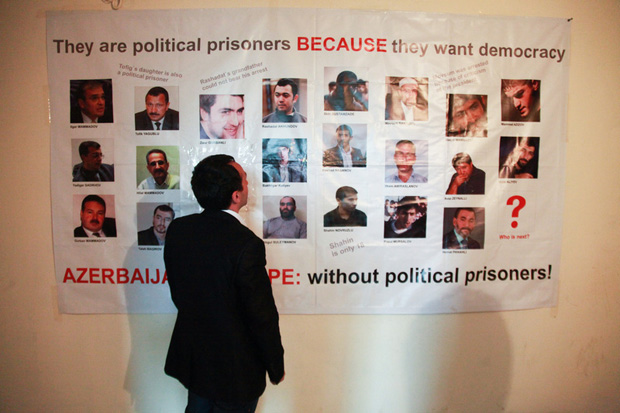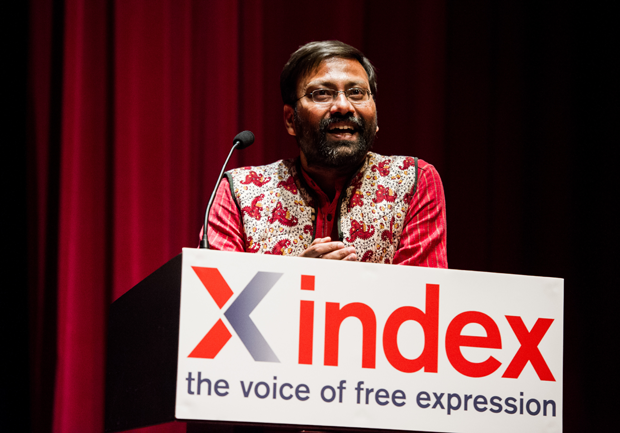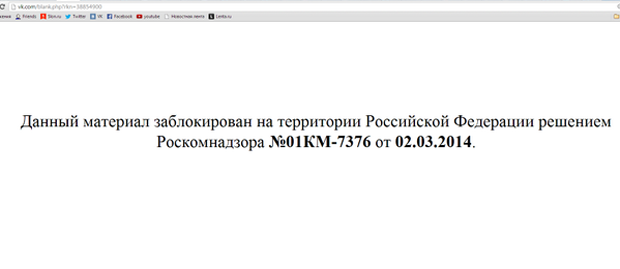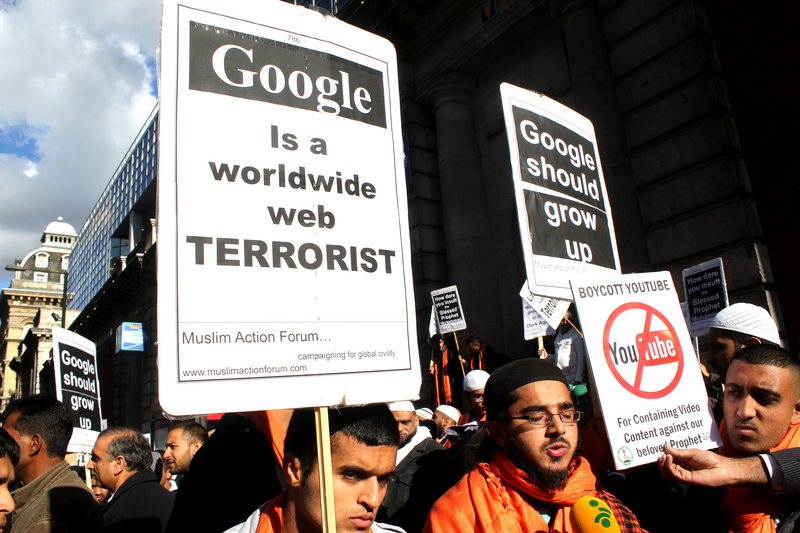27 May 2014 | Azerbaijan, Azerbaijan News, Politics and Society

(Image: Aziz Karimov)
An Azerbaijani journalist and blogger has been sentenced to five and a half years imprisonment after publishing posts deemed critical of the authorities on Facebook. Abdul Abilov, who runs the Facebook page “Stop sycophants!” was charged with illegal possession, storage, manufacturing or sale of drugs at the Baku Serious Crimes Court. The social media page was closed down shortly after his arrest.
Emin Huseynov, chairman of the Institute for Reporters’ Freedom and Safety (IRFS), is deeply concerned by the sentencing of journalists and bloggers in Azerbaijan, especially as the country has recently been handed chairmanship of the Committee of Ministers for the Council of Europe, a post Azerbaijan will hold for the next six months.
“Today’s harsh conviction shows once again the extraordinary measures that authorities are willing to take to crush criticism of their repressive policies, inconsistent with the country’s chairmanship of the Council of Europe,” Huseynov said in a statement. The IRFS has also called on the Council to “immediately appoint a special rapporteur on political prisoners in Azerbaijan” to analyse the situation in the country as well as raising the issue to the Parliamentary Assembly.
Abilov joins the eight journalist and seven bloggers and online activists already serving time in jail in the country for politically-motivated convictions, including the recent sentencing of the independent newspaper website editor Parviz Hashimli. And it’s not just journalists who are coming under fire from the authorities. Early May saw the sentencing of eight young activists on charges of attending to “cause public disorder”.
This article was posted on May 27, 2014 at indexoncensorship.org
20 Mar 2014 | Awards, News and features

Shubhranshu Choudhary accepting his award (Photo: Alex Brenner for Index on Censorship)
Journalist Shubhranshu Choudhary is the brain behind CGNet Swara (Voice of Chhattisgarh) a mobile-phone (no smartphone required) service that allows citizens to upload and listen to local reports in their local language.
Shubhranshu Choudhary acceptance remarks:
Over the last few centuries our politics, world over has got democratized, more or less.
But if you look at mass communication, media or Journalism it still remains aristocratic, top down and more power in the hands of few.
We understand that our political democracy can not mature, function well unless we have a democratic, equitable communication.
But is that possible?
That is the experiment we are trying to do in India.
I grew up in Central India amidst hills and forest with Indigeneous people, whom we also call Adivasis, the tribals.
Central India is in the middle of a bloody war between Maoist guerrillas and Indian security forces. Tribals are led by the Maoists.
My tribal classmates once told me “our smaller problems can be solved if we have a democratic communication platform where each has equal right to speak and being heard.
To create a democratic, more equitable media we are using mobile phone in this experiment. Mobile phones have reached deep interiors even in countries like India.
Everyone has a voice and can speak in their own mother tongue.They feel more comfortable speaking rather then writing as many do not know how to read and write. And even if they know they feel more comfortable as they are an oral community.
Though mobile is owned by many but it is a personal communication tool. We use internet to convert mobile phone into a mass communication tool.
Today the same people who had no voice before are picking up their mobile and are telling their stories in their own languages. The messages, songs get recorded in our computer using an Interactive Voice recorder system and people can hear the same messages on their mobiles once they are cross-checked moderarted by some volunteers.
The same messages are also available online for Urban activists to follow with officials if they are about any problem. We are seeing many problems getting solved by making this simple connectivity.
An accumulation of these unsolved simple problems create bigger problems like the one we are facing in Central India today, which our Prime Minister once called India’s biggest internal security threat.
If problems are not being heard, not being solved, they create the “future terrorists”
But to complete this experiment we need your help.
We need help to connect this experiment to Short wave radio to create a duplicatable and sustainable independent communication model which people can own.
India, though, is world’s biggest democracy, we do not allow Radio. We will need help from outside like yours who can give us space in Radio transmitters.
But it will be a different type of radio, new radio. In this democratic radio programs will not be created in studios or newsrooms but they will be created in far off forests and villages where people through their mobile phone will report. Some of us in the middle on computer/internet will work on improving/editing them.
We Journalists will also be elected by the community and not selected by the powerful few.
This way we will create news which is by the people, of the people and for the people.
If we want a better democracy, a peaceful tomorrow we can not leave Journalism in the hands of few any more. Time has come like politics, Journalism also needs to become everybody’s business.
And it is possible.
— Shubhranshu Choudhary, CGNet Swara
More about Shubhranshu Choudhary
This article was originally posted on 20 March 2014 at indexoncensorship.org
3 Mar 2014 | Europe and Central Asia, News and features, Russia, Ukraine

(Image: @ilya_shepelin/Twitter)
Russian authorities have blocked access to 13 sites connected to “Ukrainian nationalist organisations” on the social media site Vkontakte, Russia’s answer to Facebook.
The Russian General Prosecutor’s Office requested that Roskomnadzor — the Federal Service for Supervision of Communications, Information Technology and Mass Media — block the pages, the body said in a statement Monday. The pages promoted Ukrainian nationalist groups and “contained direct appeals to Russian people to conduct terrorist activities,” the statement read.
There had been reports over the weekend of pages on Vkontakte being blocked, but the message from Roskomnadzor confirms this.
While it is unclear which sites the ban covers, it appears a group connected to the Euromaidan protests is one of them. A screen grab, allegedly from a Euromaidan group, first shared by a journalist from Russian news site slon.ru, read: “This material was blocked on the territory of Russian Federation by a decision by the State Communication Committee” and that the decision had been made on 2 March.
This article was posted on March 3, 2014 at indexoncensorship.org
27 Feb 2014 | News and features

The Innocence of Muslims is truly the free speech story that keeps on giving. The crude, cheaply made anti-Islam film sparked international outrage when it first appeared on YouTube in September 2012, with even President Obama forced to weigh into the debate after the US Embassy in Cairo issued a tweet “condemning” the video. While ostensibly supporting free speech, the White House did suggest that Google should examine whether the video contravened its own terms of service.
Google eventually blocked the video of its own accord in Libya and Egypt. Meanwhile, in its move to censor the film, Pakistan simply blocked the whole of YouTube.
Now, a US court has ruled that Google should remove the video from YouTube. Not because of blasphemy, but because of copyright. The case against Google and the makers of the film was brought by actress Cindy Lee Garcia, who appears in the film for all of five seconds. Garcia claims that her single line, suggesting that Muhammad was a “child molester” was dubbed, and that she was duped into appearing in the anti-Muslim film, having been told it was a trailer for an adventure movie.
Crucially, she also says that she has a claim to the copyright of the film. The Ninth Circuit Court of Appeals agreed that she may have a claim, and on 19 February ordered Google to remove the film from its YouTube service.
The court further ordered that the ruling be kept secret until 26 February, when the 37-page opinion on the case was issued “to prevent a rush to copy and proliferate the film before Google can comply with the order.”
Google has said it will appeal the order, saying that not only could the copyright claim of a bit-part actor create havoc for filmmakers of the future, but that service providers could now also be swamped with takedown requests from people who regret appearing in works in the public domain.
Interestingly, it also suggests that the simple removal of the video could constitute a tampering with the historical record. That chimes with an argument Index has made before – we seem far more comfortable with the removal of web content than we do with, say, the pulping of books, even though the intent is the same.
As things stand, Google has complied with the order, and the Innocence of Muslims can no longer be found on YouTube.
In yet another twist, Pakistani web freedom campaigner and Index on Censorship award nominee Shahzad Ahmed has used the removal of the video to pressure his government to lift the YouTube ban.
“We think that now the government of Pakistan has been left with no excuse to continue blocking access to YouTube,” he is reported as saying. “But the ban on YouTube has got more to do with the government’s desires and efforts to impose censorship, content filtering and moral policing and we are fighting against them in court through a constitutional petition.”
This article was posted on February 27, 2014 at indexoncensorship.org




